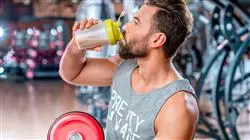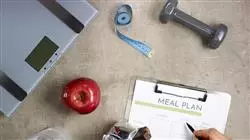University certificate
Scientific endorser

The world's largest faculty of nursing”
Introduction to the Program
People who perform intense Physical Exercise on a regular basis need to eat a balanced diet rich in nutrients, so it is important to have professionals capable of guiding them in nutritional matters".

Most of the factors that determine the state of health are linked to both diet and regular physical exercise. In the case of the athlete, a balanced diet has to supply sufficient energy to cover all needs, and must provide all nutrients in adequate quantities, taking into account individual characteristics and needs, and adapting the intake to the type of sport performed and the specific training of each person.
An adequate diet, in terms of quantity and quality, before, during and after physical-sports activity is essential to optimize performance. However, it is necessary to bear in mind that a good diet cannot replace an
incorrect training or regular physical form, since an inadequate diet can impair the performance of a well-trained athlete.
The Professional Master's Degree in Sports Nutrition for Nursing aims to be a tool that helps nurses in relation to comprehensive care for the user who practices some kind of physical-sports activity, both for healthy purposes and in competition, and its objective is to study the relationship and importance of nutrition and physical-sports activity and to provide current scientific knowledge demonstrating the beneficial effects of exercise, as well as the mechanisms by which it enhances health.
As it is an online Postgraduate Certificate, students are not conditioned by fixed schedules or the need to move to another physical location, but can access the contents at any time of the day, balancing their work or personal life with their academic life.
Additionally, this academic itinerary has the participation of an international expert of international reference in the management and applications of Sports Nutrition. A renowned specialist who, as a Guest Director, is in charge of 10 exhaustive Masterclasses. These, turn this TECH program into the most attractive opportunity for updating and professional improvement in the university setting.
Join now this TECH program that offers 10 Masterclasses taught by a renowned international specialist".
This Professional master’s degree in Sports Nutrition for Nursing contains the most complete and up-to-date scientific program on the market. The most important features include:
- The graphic, schematic and practical contents of the course are designed to provide all the essential information required for professional practice
- It contains exercises where the self-assessment process can be carried out to improve learning
- An algorithm-based interactive learning system, designed for decision-making for patients with nutritional problems
- Theoretical lessons, questions to the expert, debate forums on controversial topics, and individual reflection assignments
- Content that is accessible from any fixed or portable device with an Internet connection
This Professional master’s degreeis the best investment you can make in the selection of a refresher program for two reasons: in addition to updating your knowledge in Sports Nutrition for Nursing, you will obtain a degree from TECH Global University"
The program’s teaching staff includes professionals from the sector who contribute their work experience to this educational program, as well as renowned specialists from leading societies and prestigious universities.
The multimedia content, developed with the latest educational technology, will provide the professional with situated and contextual learning, i.e., a simulated environment that will provide immersive education programmed to learn in real situations.
This program is designed around Problem-Based Learning, whereby the professional must try to solve the different professional practice situations that arise during the course. For this purpose, students will be assisted by an innovative interactive video system created by renowned and experienced experts.
This program offers specialization in simulated environments, which provides an immersive learning experience designed to prepare for real-life situations"

This 100% online Professional Master's Degree will allow you to balance your studies with your professional work while increasing your knowledge in this field"
Why study at TECH?
TECH is the world’s largest online university. With an impressive catalog of more than 14,000 university programs available in 11 languages, it is positioned as a leader in employability, with a 99% job placement rate. In addition, it relies on an enormous faculty of more than 6,000 professors of the highest international renown.

Study at the world's largest online university and guarantee your professional success. The future starts at TECH”
The world’s best online university according to FORBES
The prestigious Forbes magazine, specialized in business and finance, has highlighted TECH as “the world's best online university” This is what they have recently stated in an article in their digital edition in which they echo the success story of this institution, “thanks to the academic offer it provides, the selection of its teaching staff, and an innovative learning method aimed at educating the professionals of the future”
A revolutionary study method, a cutting-edge faculty and a practical focus: the key to TECH's success.
The most complete study plans on the university scene
TECH offers the most complete study plans on the university scene, with syllabuses that cover fundamental concepts and, at the same time, the main scientific advances in their specific scientific areas. In addition, these programs are continuously being updated to guarantee students the academic vanguard and the most in-demand professional skills. In this way, the university's qualifications provide its graduates with a significant advantage to propel their careers to success.
TECH offers the most comprehensive and intensive study plans on the current university scene.
A world-class teaching staff
TECH's teaching staff is made up of more than 6,000 professors with the highest international recognition. Professors, researchers and top executives of multinational companies, including Isaiah Covington, performance coach of the Boston Celtics; Magda Romanska, principal investigator at Harvard MetaLAB; Ignacio Wistumba, chairman of the department of translational molecular pathology at MD Anderson Cancer Center; and D.W. Pine, creative director of TIME magazine, among others.
Internationally renowned experts, specialized in different branches of Health, Technology, Communication and Business, form part of the TECH faculty.
A unique learning method
TECH is the first university to use Relearning in all its programs. It is the best online learning methodology, accredited with international teaching quality certifications, provided by prestigious educational agencies. In addition, this disruptive educational model is complemented with the “Case Method”, thereby setting up a unique online teaching strategy. Innovative teaching resources are also implemented, including detailed videos, infographics and interactive summaries.
TECH combines Relearning and the Case Method in all its university programs to guarantee excellent theoretical and practical learning, studying whenever and wherever you want.
The world's largest online university
TECH is the world’s largest online university. We are the largest educational institution, with the best and widest online educational catalog, one hundred percent online and covering the vast majority of areas of knowledge. We offer a large selection of our own degrees and accredited online undergraduate and postgraduate degrees. In total, more than 14,000 university degrees, in eleven different languages, make us the largest educational largest in the world.
TECH has the world's most extensive catalog of academic and official programs, available in more than 11 languages.
Google Premier Partner
The American technology giant has awarded TECH the Google Google Premier Partner badge. This award, which is only available to 3% of the world's companies, highlights the efficient, flexible and tailored experience that this university provides to students. The recognition as a Google Premier Partner not only accredits the maximum rigor, performance and investment in TECH's digital infrastructures, but also places this university as one of the world's leading technology companies.
Google has positioned TECH in the top 3% of the world's most important technology companies by awarding it its Google Premier Partner badge.
The official online university of the NBA
TECH is the official online university of the NBA. Thanks to our agreement with the biggest league in basketball, we offer our students exclusive university programs, as well as a wide variety of educational resources focused on the business of the league and other areas of the sports industry. Each program is made up of a uniquely designed syllabus and features exceptional guest hosts: professionals with a distinguished sports background who will offer their expertise on the most relevant topics.
TECH has been selected by the NBA, the world's top basketball league, as its official online university.
The top-rated university by its students
Students have positioned TECH as the world's top-rated university on the main review websites, with a highest rating of 4.9 out of 5, obtained from more than 1,000 reviews. These results consolidate TECH as the benchmark university institution at an international level, reflecting the excellence and positive impact of its educational model.” reflecting the excellence and positive impact of its educational model.”
TECH is the world’s top-rated university by its students.
Leaders in employability
TECH has managed to become the leading university in employability. 99% of its students obtain jobs in the academic field they have studied, within one year of completing any of the university's programs. A similar number achieve immediate career enhancement. All this thanks to a study methodology that bases its effectiveness on the acquisition of practical skills, which are absolutely necessary for professional development.
99% of TECH graduates find a job within a year of completing their studies.
Professional Master's Degree in Sports Nutrition for Nursing
Nursing services can be fundamental in the health care of athletes, especially when they resort to professional nutrition counseling. This is due to the fact that specialists in this area have a high knowledge of the physiological processes and the requirements of the organism to adapt to the conditions demanded by their high performance. For this reason, having updated medical staff to apply the different tools to provide advanced nutritional support and optimize the physical condition and responsiveness of their patients is essential. At TECH Global University we designed this Professional Master's Degree in Sports Nutrition for Nursing, a postgraduate program that will allow you to specialize in this field of medicine and participate in the sports nutrition planning process.
Study a Professional Master's Degree with us
With this program you will be able to update your knowledge about nutrition and supplementation for high performance athletes, as well as its application in the Nursing field. Through the study plan you will be able to analyze, interpret and integrate clinical, biochemical and anthropometric data during the nutritional assessment of the patient. Likewise, you will be able to identify the symptoms and alterations associated with nutritional imbalance and apply the dietetic-nutritional treatment that you consider most appropriate for the well-being of the people who seek your advice. All this with the objective of promoting strategies oriented to provide individualized care and high quality attention.
Get certified in the largest Nursing School in the world.
At TECH Global University we recognize the importance of encouraging specialized education and research through programs that can provide you with information, techniques and methodologies of high academic level. In this Professional Master's Degree you will be accompanied by experts in the area and a study plan with innovative methods focused on online learning. In addition, you will be able to access the best educational materials from any place and device at your disposal, as well as have at your fingertips new skills that will allow you to perform better and contribute to the development of this field. Get certified and expand your professional profile.







